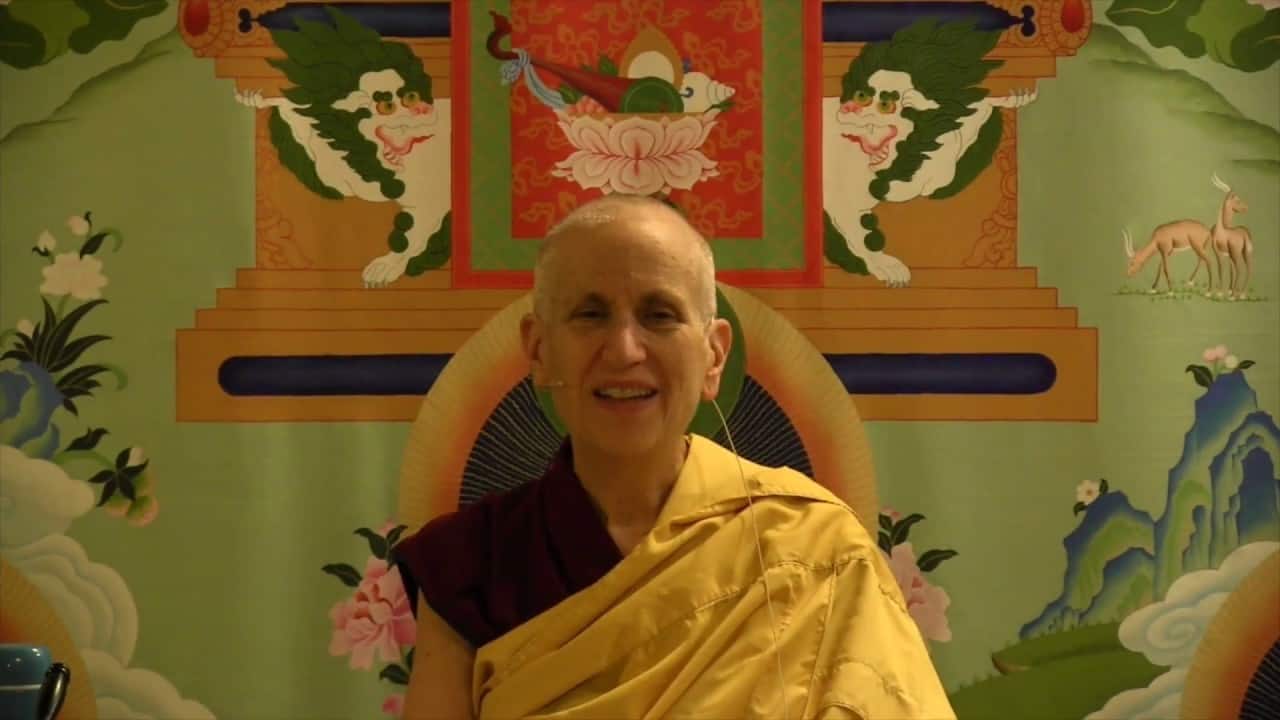Equalizing self and others
The text now turns to relying on the method for happiness in future lives. Part of a series of teachings on the Gomchen Lamrim by Gomchen Ngawang Drakpa. Visit Gomchen Lamrim Study Guide for a full list of contemplation points for the series.
- Dramatization of how the self-centered thought impedes our love and compassion for others
- Review of previous lamrim sections on developing bodhicitta
- Developing equanimity in the context of the Equalizing and exchanging self and others meditation
- Exchanging the identities of “me” and “you”
- The basis for saying that all beings equally deserve happiness and freedom from suffering
Gomchen Lamrim 73: Equalizing self and others (download)
Contemplation points
Included below is the equanimity meditation to precede the Equalizing and Exchanging Self and Other method of generating bodhicitta.
Conventional level (from the view of self)
- Sentient beings have equally helped us immeasurably, undergone hardships, and faced problems for our benefit. When we take into account our beginningless lifetimes, this is certainly the case. But even if we think about just this life, we can see that everything comes from others’ effort. Everything we have owned, eaten, worn and so on has come to us through the kindness of others. It is all thanks to them. Really spend some time with this, going through the many contributions that others have made to your life, especially the people we don’t normally think about (people who grow food, build houses and roads, etc). Get a feeling that others have been incredibly kind.
- We may think, in response to this first point, that they also harm us sometimes, but the help is thousands of times greater! Do you find you gravitate towards ruminating on the harm instead of the kindness? Take this time to bring to mind the kindness of others and get a feeling for how it outweighs any harm you’ve received.
- Even in the few cases where others have harmed us, seeking revenge is completely self-defeating. Since death is definite and the time is indefinite, wanting to harm others makes no sense. It is like the squabbling of prisoners condemned to death.
Conventional level (from the view of others)
- Sentient beings are equal in terms of wanting happiness and not wanting suffering. They are equal in having a right to these. We can’t say that anybody is more important than anyone else. Every way we look at it, they are equal. Get a feel for this in your mind and generate a sense of respect for every being.
- Given sentient beings’ equal wish for happiness and their equal right to it, then it would be totally inappropriate if we helped some beings with a partial mind, if we favored some beings and not others. For example, if there were ten beggars, all hungry and thirsty, would it be right in your mind to be biased towards some and not others? Remember, on a practical level, we may not have the capacity to help everyone, but on an internal level, we can cultivate an attitude that regards them equally and would like to be able to help them equally.
- Similarly, when you have ten patients, all sick with disease and suffering immensely, is it right to wish only some of them recovery and wish others to die?
Ultimate level
- We develop attachment for those who help us and are nice to us. For those who insult us or do what we don’t like, we loathe them and see them as bad. We see them as good or bad from their own side, independent from us. If people were really like this, from their own side, the Buddha would see them in that way and would favor some over others, but he doesn’t. They say if one person is massaging him and the other is cutting him, from the side of the Buddha, he doesn’t regard one as good and the other bad.
- People appear nice and horrible from their own side as if they were permanently that way. The appearance of someone as good or bad is a dependent arising, and even that comes about in dependence upon the gathering together of particular causes and conditions, such as a little help or harm. It is thus something changeable by nature. It is not fixed. Think about how relationships have changed in your life, how friends become enemies, strangers become friends, enemies become strangers, etc. Consider how it isn’t possible for the categories of friend-enemy-stranger to be solid and unchanging, rather they are transitory, so it is inappropriate to favor some vs. others.
- Similarly, we think, “This person is my enemy and this is my friend,” as if they were always, permanently, and irrevocably that way. In fact, these roles are relative. We can only posit friend because we posit enemy, so these cannot exist from their own side. Like this mountain and that mountain, to you, you are “me” and to me, I am “me.” Who is the real “me?” It’s a matter of perspective. They don’t exist independently.
Conclusion: Seeing that all beings equally desire happiness and freedom from dukkha, and that each and every living being has shown us immeasurable kindness, it just doesn’t make sense to favor one person over another. In the end, the bias that we so easily justify leads to so much unhappiness for ourselves and others. Resolve to continue considering these points and to work towards eliminating the bias that works for the happiness of only a few.
Venerable Thubten Chodron
Venerable Chodron emphasizes the practical application of Buddha’s teachings in our daily lives and is especially skilled at explaining them in ways easily understood and practiced by Westerners. She is well known for her warm, humorous, and lucid teachings. She was ordained as a Buddhist nun in 1977 by Kyabje Ling Rinpoche in Dharamsala, India, and in 1986 she received bhikshuni (full) ordination in Taiwan. Read her full bio.


